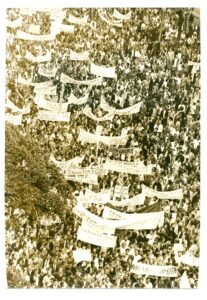1968 marked a year of global youth unrest, and Brazil was no exception. The death of student Edson Luis de Lima Souto sparked huge protests. Read the CIA report on this phenomenon of youth protest: Restless Youth.
In response to unrest such as the massive protests over Souto’s death and the refusal by Congress to suspend Márcio Moreira Alves’ political rights, the government of Costa e Silva passed the fifth Institutional Act. This act, seen as the turning point in the dictatorship toward a more “hardline” and repressive stance, allowed the president to force Congress into recess, and to suspend elected legislators’ terms and appoint politicians by decree. It also suspended the law of habeas corpus for political prisoners, and allowed the president to suspend the political rights of any politician or civilian deemed subversive for up to 10 years.
Read a biography of Márcio Moreira Alves and read a translation of his speech that stirred up military leaders.
Read a CIA report of Brazil’s “arrival at dictatorship,” signified by Institutional Act No. 5, or explore State Department telegrams about the situation arising in Brazil, and suggestions for the official U.S. stance on the matter.
Read a biography of Robert M. Levine, including his letter to the editor of the New York Times about Brazil.


